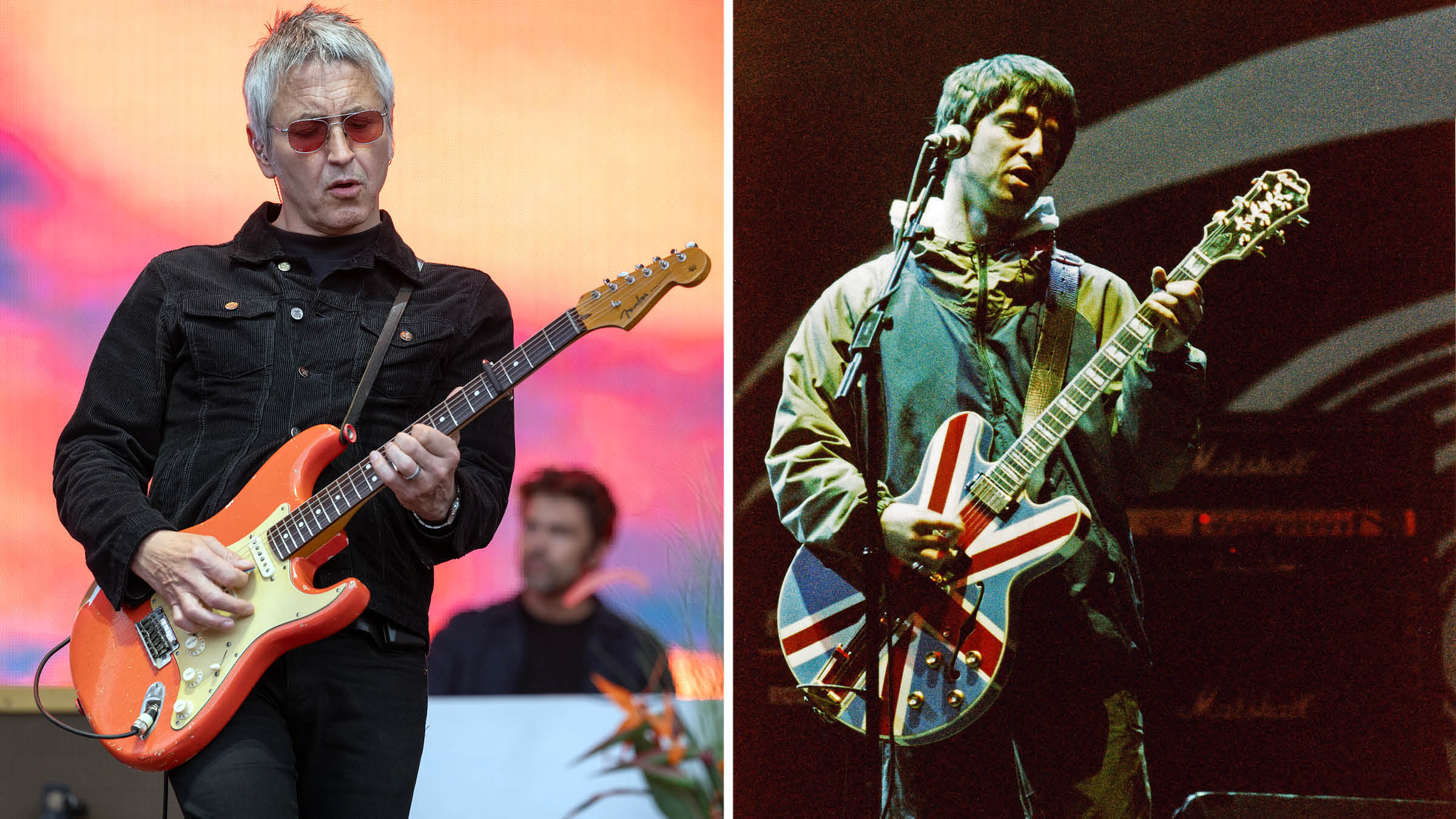Atomic Punks: Dave Mustaine and Chris Broderick Reminisce About Megadeth’s History and Talk 'Super Collider'
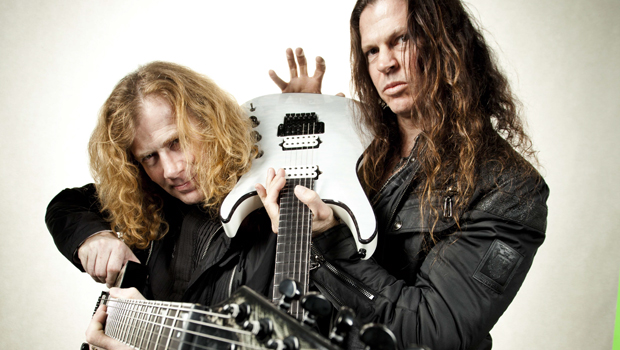
If you count yourself among those music fans that never thought a band as volatile as Megadeth would still be around to celebrate turning 30, you’ll find yourself in good company. Dave Mustaine didn’t imagine they’d make it either, back when they formed, in 1983.
“To be totally frank, I didn’t even think I’d live this long, let alone have a career this long,” the singer and guitarist admits. “I remember Junior [bassist Dave “Junior” Ellefson] and I had this crazy pact back then that if the band didn’t make it, we’d go out in a blaze of glory together. It was childish at the time, but it’s weird when you look back and think, 30 years, man! Wow! Did we really do all that?”
In fact, Megadeth did do all that, from helping to spawn thrash metal to creating landmark genre albums like Peace Sells… But Who’s Buying? and Rust in Peace to joining their fellow founding fathers on the triumphant Big 4 festival jaunt a couple of years back. They’ve also continued to churn out top-notch new material, and at a healthy clip, too. The band’s newest, 14th studio album is Super Collider, their first release on Mustaine’s own label, Tradecraft, which is distributed by Universal.
It’s another strong addition to Megadeth’s catalog and might also be their most diverse. Some of its songs, like “King Maker” and “Built for War,” are the type of knotty speed-metal workouts at which the band has long excelled. But the new album also veers into more melodic territory on tracks like “Forget to Remember” and even flirts with country-inflected rock on “Blackest Crow,” which features banjo-style licks from lead guitarist Chris Broderick and, for the first time on a Megadeth record, slide guitar playing from Mustaine.
Then there are the album’s two standout tracks. One is the multipart “Dance in the Rain,” which begins in the midtempo style the band has explored in more recent years, and then moves into a pummeling second half that recalls the ferociously caustic Megadeth of Killing Is My Business… and Business is Good!
The other is “Super Collider,” which is perhaps the most bright-hued song in the Megadeth canon, with an uncharacteristically optimistic lyric and a chorus built on open, ringing major chords. “It’s one of those songs that makes people happy, like ‘A Tout Le Monde,’ ” Mustaine says, referencing the 1994 Youthanasia track.
“You’ve gotta have some songs like that that everybody can come together on.” But, he’s quick to stress, not too many. “I’d be lying,” he admits with a slight laugh, “if I said I would dig having a whole set of songs like that.”
All the latest guitar news, interviews, lessons, reviews, deals and more, direct to your inbox!
Fresh off recording Super Collider, and with additional mixing and mastering still to be done, Mustaine and Broderick sat down with Guitar World to discuss the new album, their gear and how they work together as musicians and bandmates. Mustaine, now 51, also took time to reflect back on 30 years of metal madness with Megadeth. Regrets? He’s had a few …
GUITAR WORLD: Super Collider is a fairly diverse record. The title track, in particular, signals a new sound for the band. How did that one come together?
DAVE MUSTAINE That song kind of came from that “Symphony of Destruction” corner of my mind. You can’t always play aggressive, thrashy stuff. Sometimes those aren’t even songs; they’re like musical rams. But because I’m not a pop guy, I’m also not really comfortable playing sing-along songs. To me, “Super Collider” made sense like a normal song—a verse-chorus-verse-chorus kind of thing. It’s written the way a real songwriter would write the song, instead of just taking all these musical twists and turns.
CHRIS BRODERICK Typically, Megadeth is a guitar-driven band, and we’re super fast and tight. But it was obvious from the get-go that this song was going to be a variation of that. It’s not like I probed into Dave’s mind when he wrote it, but I really get the distinct impression that the song is based on the huge influence AC/DC had on him. I think he wanted just a big, open thing that sounded colossal. So to a large extent with that one, we wanted to keep it not so busy. I definitely had to put the reigns on some of the soloing.
MUSTAINE The funny thing is, when we started working on this record, I didn’t have any songs at all. I was just digging through demos I had made over time. And “Super Collider” was one that was just sort of hanging around.
From how long ago?
MUSTAINE It was kind of old. Parts of it were very old. I think I had just done the MD.45 record [in 1996]. The majority of it—that kind of “Baba O’Riley,” “Highway to Hell” kind of thing—is from that era.
It’s an upbeat song musically as well as lyrically.
MUSTAINE I tried to do that. It’s kind of like a “come with me on this ride” sort of thing, which could have all these spiritual connotations to some people. And a lot of that comes from the fact that I’ve been through so much stuff. Even more recently, from when all the reconciliation and everything started. That stuff was hard, too. The hardest part is sticking your toe in the water. But you have to do it. If you’re not willing to reconcile, you’d better be digging two graves—because you wanna kill that person, and the jealousy and hatred is gonna get you too.
Are you talking about musical or personal relationships here?
MUSTAINE I’m talking about everything with Junior and having him come back; I’m talking about becoming friends with the guys in Metallica and Slayer again…this whole process for me that really started after Darrell Abbott [Pantera’s Dimebag Darrell] was shot. That changed a really big part of me. It made me realize, Wait a minute, man, these are my brothers. The competitive thing that goes on…anybody who says they don’t compete is just bullshitting you. We all want to be the best. That’s why we do this. We want to be as good as our heroes. And at some point, the bravado clicks in and you realize you’ve become really good and the only thing that’s keeping you from going further is you. And why wouldn’t you want to keep getting better?
Speaking of getting better, you’ve stated publicly that you feel Chris is the best guitarist you’ve ever played with.
MUSTAINE He’s such an enigma. What Chris is capable of doing and what he does are two totally different things. He could do a mind-blowing, over-the-fretboard seven-string solo for six minutes. But he can also play something incredibly melodic. You need to be able to play what fits the song. And that’s the cool thing about the journey we’ve been on together: we’ve learned a lot about each other as people and learned a lot from each other as players. And when it comes to solos, especially for a band like this, you gotta think about it. You gotta really think about where you’re going. You can’t just do scales and sweeps. That said, the guy can do 800 notes in four bars if he wants to.
Chris, how does it feel to hear Dave say things like that?
BRODERICK It’s always very humbling, because he’s worked with a lot of incredible guitarists. Every past player in Megadeth has brought something great to the table, and I think I’m lucky to be counted among them. But as far as how I work with Dave, in a way he makes it easy. The type of personality I am, I like to have a direction and a path and to know what I’m doing. And Dave has such a clear idea of what he wants that I don’t have to deal with a lot of decisions. I just pick up my guitar, put it on and play the songs.
Dave, is there any spot on the record where you feel Chris really shines?
MUSTAINE There’s one thing that totally made me do a double take. It’s in “King Maker.” It’s one of the little fills—a quick thing that ends with a dive bomb and then passes off to a solo of mine. And it’s just a fucking great lead. I was in the other room and I heard it, and I went, “Oh, my god. That’s the greatest thing I’ve heard you do in a long time.” Chris knows how to use his tremolo bar subtly. There are guys that excel at that—Adrian Belew, Allan Holdsworth—but not a lot of people in our world can really use the bar in a subtle way.
Chris, how did that part come about?
BRODERICK It’s really just like a 10-to-15-second thing. But I think what actually worked about that solo was that the musical intent matched the song so well. Some of the tonalities I tried to put in there were a little more off base than what someone would typically use over an E minor progression. And, actually, “King Maker” is one of my favorite tracks overall. I’m proud of some of the solo work in it, but I also love the rhythm part. It’s really driving, but it also has this laid-back triplet feel. That’s really unique to me. It’s very “Mustaine.”
Another moment of departure on the record is the song “Blackest Crow.”
BRODERICK The part at the beginning is me playing a “ganjo,” which is basically a guitar with a banjo body, and it’s strung up like a guitar. And it’s funny: if we had had a banjo in the studio, I probably would have just strung it up like a guitar anyway, to make it conducive to what I know. I think when you start working with a song, it’s almost like the song begins to develop itself. And “Blackest Crow” has an old country sound to it, so it called for that tonality. Then you just look for instrumentation to fit that tonality.
Dave is that you playing the slide parts?
MUSTAINE It is. I used my Dean VMNT, but it was on my lap.
Like a lap steel?
MUSTAINE Yes, sort of like what David Lindley does.
Lindley is a great slide player. Were you thinking of guys like that when you composed your lines?
MUSTAINE Not really. When I think of slide guitar, I think of guys like Dave Peverett from Foghat and Joe Walsh. Or Ronnie Montrose on “Bad Motor Scooter.” Learning that song was the first time I ever tried doing a slide thing. Before this record, I hadn’t used a slide in years. A lot of years—since I was in Panic [Mustaine’s first band before he joined Metallica in 1982]. I remember we played at this biker party out in the middle of a national forest, and everything went terribly wrong. That was the last time I tried it.
What gear did each of you use on the album?
BRODERICK I used my Signature Series Jacksons, which were great for not only for your typical metal moments but also for some of the mellower stuff, where I was able to get them to sound very Fender Strat-ish. My main amp was an EVH 5150 III. It has a nice grind to it, and it sits in the pocket so well. It never gets buried, but it doesn’t sound overly harsh either. Effects were pretty much all added in the box, though live I’m a total Fractal geek. I use the Fractal Axe-Fx II with a Matrix power amp. I love Fractal stuff. To me, it’s all you need.
MUSTAINE I played my VMNTs—a Silverburst one on the rhythms and a Korina on the leads. Both have my signature Seymour Duncan Live Wires. For amps, I used a Marshall JVM 410 and a white Randy Rhoads head [the Marshall 1959RR]. I played through that one wide open for the slide solo in “Blackest Crow.” My effects were pretty minimal, just my signature Zoom [the G2.1DM], an MXR Phase 90 and a Cry Baby wah.
As much as the band explores new territory on Super Collider, there are also some vintage Megadeth moments. Dave Ellefson has said that parts of the new record reminded him of Killing Is My Business… and Business Is Good!, and you can certainly hear that on something like the second half of “Dance in the Rain.”
BRODERICK Definitely. When I hear a rhythm like the one at the end of “Dance in the Rain,” I start thinking about songs like “Rattlehead” [from Killing Is My Business…] and all of that older stuff that has so much angst to it. I definitely draw from that. I think there’s a direct line to those parts. They have that same mood. That same aggression.
MUSTAINE But you know, when I’m writing stuff, I don’t think, This sounds like it’s from this era. I don’t have the ability to think like that. I wish I could. God, I’d go back to Rust in Peace and write another one! Because I was listening to it the other day and I thought, Man, what the fuck was I thinking when I wrote that? Because I know my limitations and shit, and I listen to the title track and I think, That was a lucky day!
Along those lines, you’ve been doing some of the old albums onstage for a few years now, first with the Rust in Peace 20th anniversary tour and more recently for a similar celebration for Countdown to Extinction.
MUSTAINE It’s like a big giant circle. We were actually mixing the Countdown live DVD at the same time we were doing Super Collider. And the interesting thing is, I was listening to those songs and thinking they’re just as relevant today. Take “Psychotron,” and think about all the stuff that’s going on now with drones [unmanned combat vehicles]. So I don’t feel that there’s such a big stretch between then and now with this band. The only time I experience the passage of time is when I try to sing some of those songs. My voice doesn’t go that high anymore!
Chris, did the process of learning Megadeth’s back catalog for those anniversary tours inform how you approach the new material?
BRODERICK I think so. Everything that I’ve learned from the past repertoire gives me more insight into the sound, the mood and how to phrase my parts within Megadeth. I think once a band is in the public eye, it’s almost like the music becomes the property of the public. And in some ways, you don’t want to stray too much from that sound. So every chance I get to listen to an old song that I haven’t played yet, or to work on something like the full-album tours, is an opportunity to understand more about this band.
In preparing for the Rust in Peace and Countdown tours, was there anything that you found particularly difficult to play?
BRODERICK Some of the material on Rust was a little more technically demanding, but the vibe of some of the stuff on Countdown was sometimes more of a challenge. The clean solo on “High Speed Dirt,” for example, has a really interesting feel to it. And matching that feel took a little bit of work.
Most people would automatically assume that Rust in Peace would prove the more challenging of the two.
BRODERICK Well, definitely I would say Rust is a more technical record. But there’s just something about the feel and the way Marty phrased those solos on Countdown. It’s a little different.
Speaking of the Nineties-era Megadeth, this is the first time since the Cryptic Writings album in 1997 that the same lineup has appeared on two consecutive records.
MUSTAINE Wise guy! [laughs] Really, though, it’s cool the way Dave, Chris and [drummer] Shawn [Drover] have assimilated into the group. It’s all working now. One of the things I love about playing with Chris is watching him go from being in that category of mind-blowing guitar players to developing into a songwriter as well. And with Shawn, it’s watching him learn to do things like play with brushes on “Blackest Crow” and doing things on the drums that he’s never done before.
I remember when Junior was gone, it was just kind of weird. It never really bothered me when we were swapping out drummers and guitar players, but something just felt out of balance without him there. You know, sometimes I think, Man, the times that we were with [former bassists] James MacDonough and James LoMenzo, it was like the lost years, like with Maiden when they had that Blaze [Bayley] guy or Priest when they had Ripper [Owens]. There was something that was just a little off.
Considering what’s gone on in the band over the years, is there anything that you regret?
MUSTAINE I do regret some stuff. I regret a lot of the pain that I caused people. I very much regret that. I regret a lot of the good times I missed out on because of the various feuds that we all had. I regret that Gar [Samuelson, Megadeth drummer from 1984 to 1987] died and I didn’t get to say goodbye to him. He was a friend of mine. Sadly, we met in addiction, and our relationship was destined to last as long as it did. And it ended the way it did. But I always felt it ended wrong.
His work on those first two records [Killing Is My Business… and Peace Sells…] was phenomenal.
MUSTAINE He had a really cool style. And I think it helped Megadeth sink its teeth into this big old elephant and just hang on. We had that really aggressive, peculiar jazz element to us because of him. He really understood music. Of course, playing live with that lineup, with Gar, Junior and [guitarist] Chris [Poland], was a crapshoot. [laughs] Because we were all really heavily under the influence, and it always depended on everyone’s blood-alcohol level or drug count at the moment.
I remember one time we played in McAllen, Texas, and one of the guys had gone down to Mexico and gotten some Mandrakes [Quaaludes], which were illegal in the States.
I had just gotten done telling Gar that we bought a bomb to light off at the show. And of course, being broke and on the road, he only had one set of sticks left. When the bomb went off, he freaked out and threw his drumsticks and the music stopped. It was as if you could hear his sticks hit the ground. That was the same show that Poland fell through the stage. He jumped back up and his arm was gushing blood, and he smiled at me. And you know, as much as I had my issues with the man, he’s got this smile that’s like a Dennis the Menace kind of thing; you can never stay mad at him. I think that’s probably why we had so much fun. But we also got in a lot of trouble.
It’s now been 30 years since you formed Megadeth. Given everything you’ve gone through to get to Super Collider, are you where you thought you’d be in your career?
MUSTAINE Really, I’m just so grateful that I’m still working and I still have fans. Because it’s a dog-eat-dog business, and it isn’t easy to survive. But I think the cool thing about people is that when you do something wrong and you apologize for it, they’re really forgiving. I’ve done some things wrong, but I’ve also done some things right. And we’ve managed to get through it. I’ve managed to get through it. [laughs] I don’t know, maybe it’s the redhead in me.
Photo: Travis Shinn
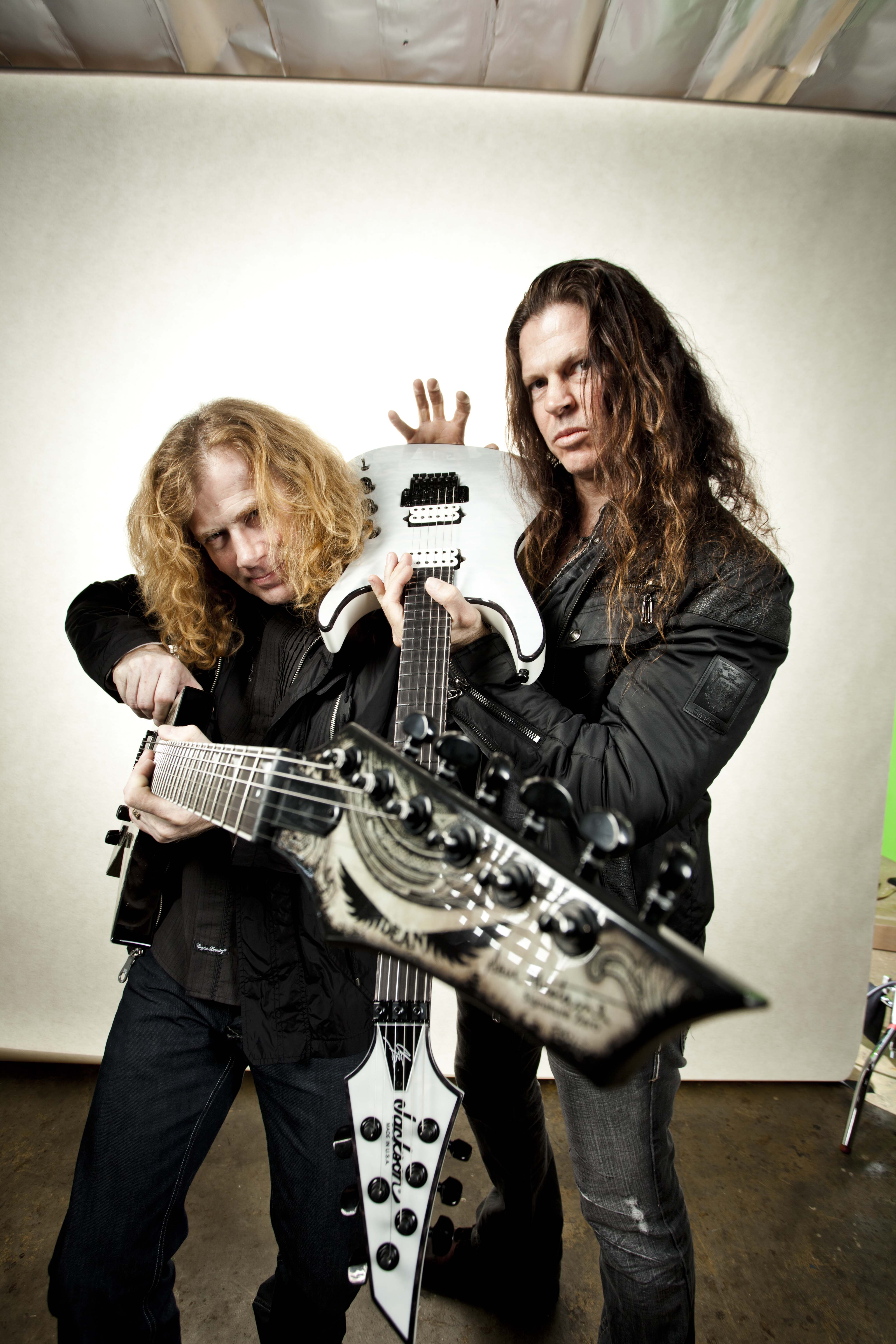
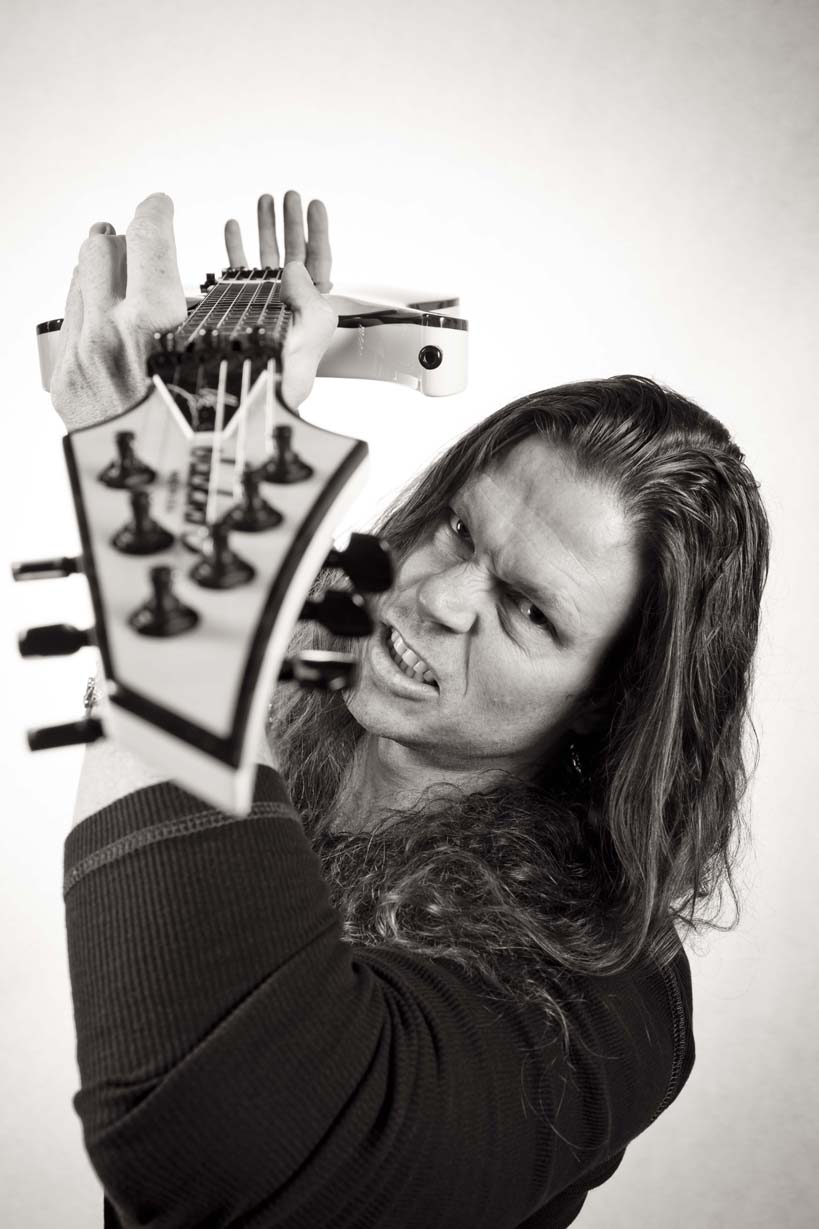
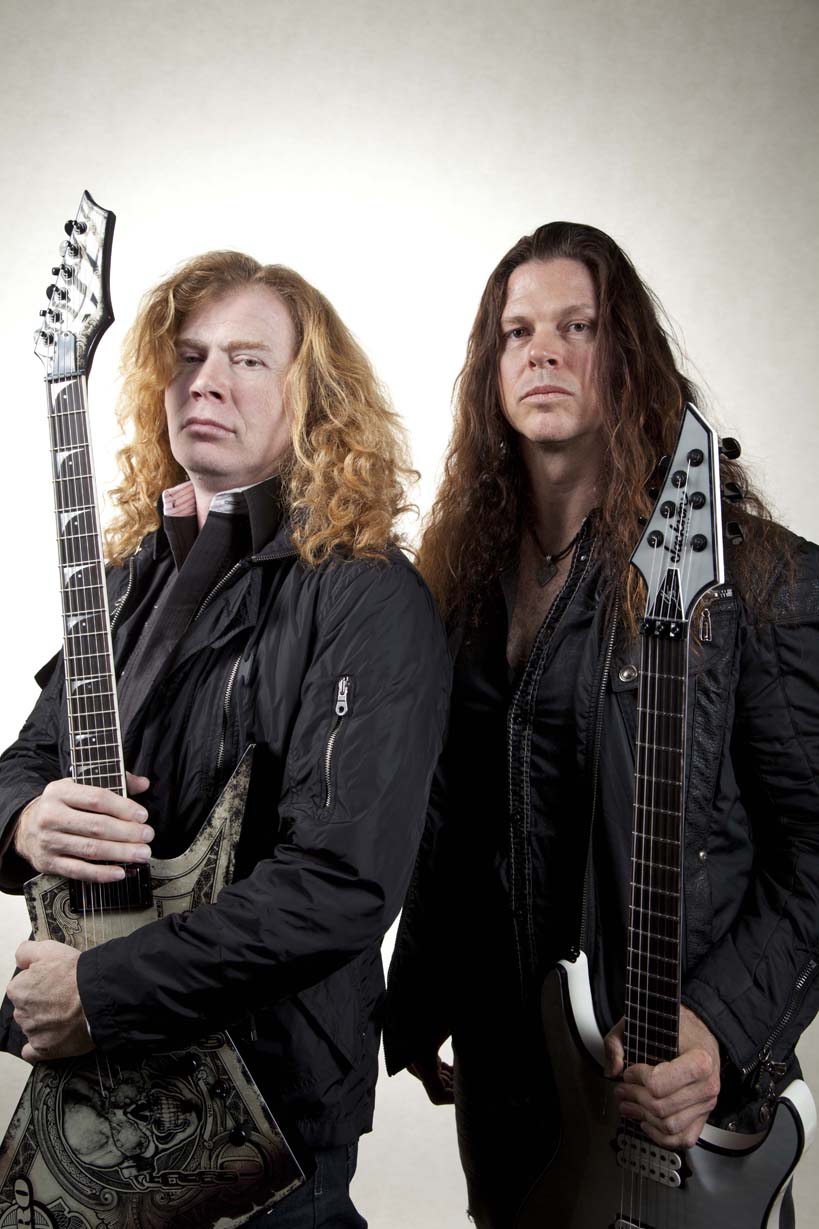
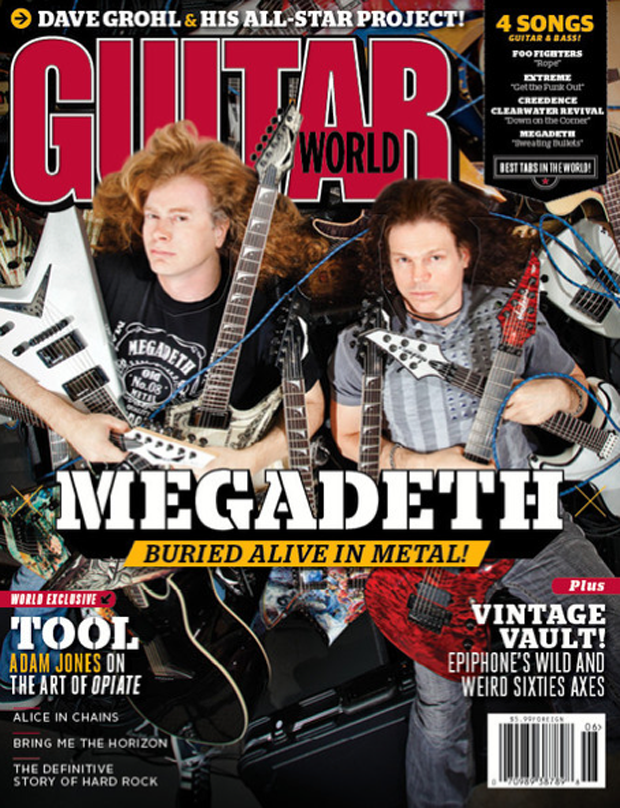
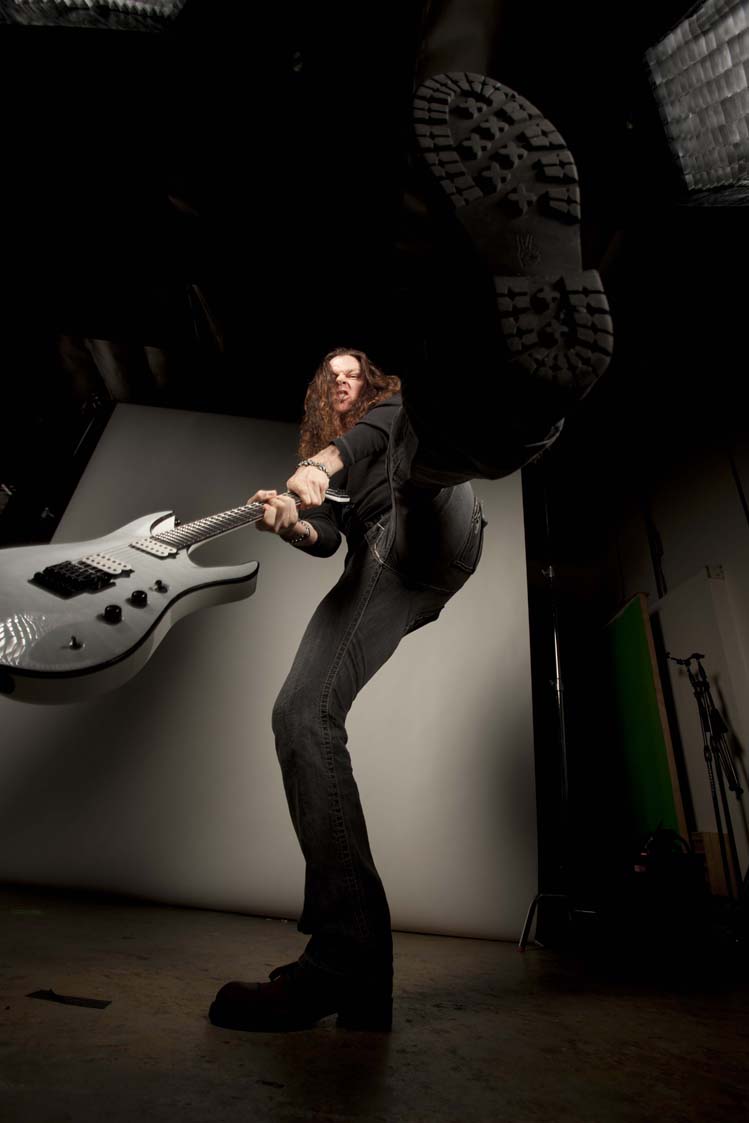

Rich is the co-author of the best-selling Nöthin' But a Good Time: The Uncensored History of the '80s Hard Rock Explosion. He is also a recording and performing musician, and a former editor of Guitar World magazine and executive editor of Guitar Aficionado magazine. He has authored several additional books, among them Kurt Cobain: Montage of Heck, the companion to the documentary of the same name.

